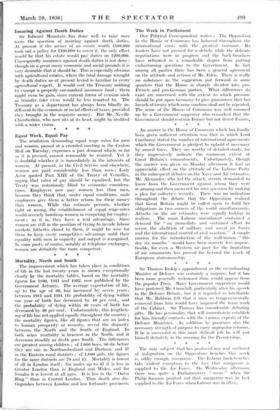Equal Work, Equal Pay The resolution demanding equal wage rates
for men • and women, passed at a crowded meeting in the Caxton Hall on Tuesday,• expresses a just demand which, so far as it is pressed, cannot reasonably be resisted. Yet it is doubtful whether-it is immediately in the interests of - «•omen. At present, in the Civil Service and elsewhere, women are paid considerably less than mew; Lady Astor . quoted .Part XIII of the Treaty of Versailles, urging that rates of pay should be equalised, but the 'treaty was notoriously blind to economic considera- tions. Employers now pay women less than men, because• they think that, under equal conditions, male employees give them - a better return for their money than women. While this estimate persists, whether right or wrong, the establishment of equal wage-rates would severely handicap women in competing for employ- ment ; as it is, they have a real advantage. Since women are still in the position of trying to invade labour markets hitherto closed to them, it might be wise for them to keep every competitive advantage until their equality with men in capacity and output is recognised. In some posts, of course, notably at telephone exchanges, women are definitely the more competent.


































































 Previous page
Previous page